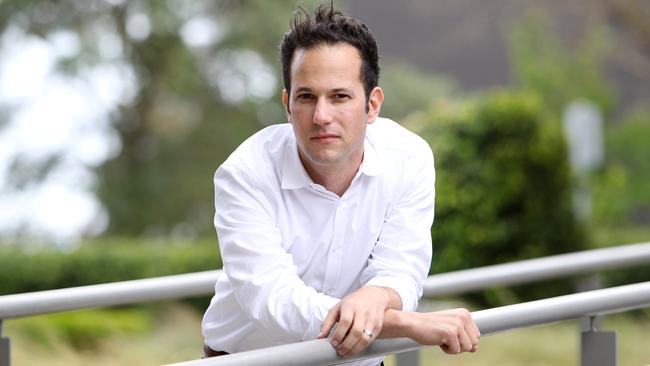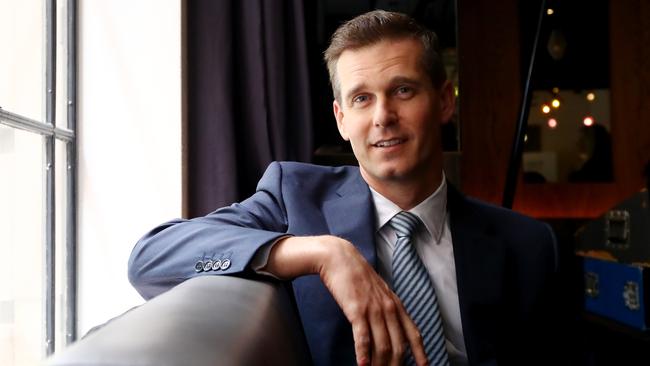Star economists at e61 Institute turn to big data to solve policy problems
Covid kept University of Chicago economics professor Greg Kaplan in Australia for 14 months, in which time he helped set up a new economic think tank, the e61 Institute.

Greg Kaplan, one of the nation’s rock star expats, was back in Australia on one of his regular visits in June 2020 as the pandemic set in.
Fourteen months later, the professor of economics at the University of Chicago and his family finally flew home.
It had been an unexpected stay – but a productive one that has led to the launch of a $13m institute dedicated to fundamental economic research on contemporary Australian policy questions.
Stuck in Australia, the Macquarie University graduate with a Masters from the London School of Economics and a PhD from New York University met, for the first time, another economic whiz kid – Andrew Charlton, a graduate of the University of Sydney with a doctorate from Oxford, who worked for Kevin Rudd during the Global Financial Crisis, set up his own advisory firm, AlphaBeta, then sold it to Accenture, where he is now a managing director.
In those months of Covid-19 conversation, the duo formed a plan to set up a nonpartisan, not-for-profit think tank dedicated to econometric research, capitalising on a revolution in big data that has made information more immediate and more accessible
With that $13m grant over three years from the Susan McKinnon Foundation, the e61 Institute (e is for economics, 61 for Australia) has already attracted some bright operators to its staff, expected to grow to about two dozen in the next couple of years.
Among the hires are former Treasury and OECD productivity specialist Dan Andrews; former senior research manager at the Reserve Bank Gianni La Cava; and Joanna Wood, a former business operations manager at Accenture.
The Susan McKinnon Foundation was set up in 2015 by Grant Rule and wife Sophie Oh and named after Rule’s mother.
Rule made his money at MessageMedia, a mobile tech company that he sold last June to Swedish company Sinch for $1.7bn.
Rule says one of the foundation’s goals is to contribute to constructive policy dialogue and it has “complete alignment” with e61’s commitment to making an impact on policy, and to political neutrality.
The institute also has support from the Macquarie Business School and Becker Friedman Institute for Research in Economics at the University of Chicago.
Kaplan, Charlton and Rule are co-directors of e61 and there’s an impressive list of senior academic fellows, including Justin Wolfers, another high-profile expat who is professor of economics and public policy at the University of Michigan, and who also spent time back home during Covid. The new institute will create something of a reverse brain drain, allowing bright expats, along with local researchers, to apply their skills to Australian problems without leaving their day jobs.

Says Charlton: “There are lots of economists here during the pandemic, and the feeling was, how do we use these people who are at the top of their game, doing some of the world’s most interesting work?
“There was a recognition too that this was part of a bigger opportunity to better connect research and policy to build better evidence-based policy solutions.
“The goal is to bring the best research in academia together with the most important policy challenges facing Australia. And that requires people to have an understanding of both sides of that coin.
“Australia has fantastic researchers and I would list most of the people involved in e61 as some of Australia’s greatest researchers in economics. This (institute) gives them a vehicle to connect with our most pressing policy questions.”
Charlton notes the lack of consensus for reform compared with the 1980s and 1990s, when there was a strong link between academia, policymakers, politicians and business about the need fundamental reforms.
“Not everybody agreed, but there was a multi-constituency weight of opinion and evidence around the need to liberalise and improve the competitiveness of our economy,” he says. “I’m not sure that wider consensus exists now. Even things that used to be taken for granted as articles of faith in the economic and policy community … seem to be controversial today. So we want to help build consensus around a set of issues that over time will build support in the media, among policymakers, in academia for a new wave of policymaking.”
Charlton says the big issues include boosting productivity, increasing investment and improving the quality of management and business performance in Australia.
Kaplan says the idea of an institute like e61 had been “floating around in the back of my mind for a really long time”.
While he and Charlton had not crossed paths previously, they soon recognised their complementary skills and ideas about the need to deep data analysis in policy development. Kaplan’s research has focused on using micro-economic data to “change the way we think about macro policy questions”. He says “real time” data needs to be assessed in tandem with economic theory.
“The data that’s available to us now is just orders of magnitude richer and deeper than it was even five years ago,” he says. “We used to rely almost exclusively on survey data, but today we can increasingly turn to administrative data that is collected by businesses and government in the course of running their operations.
“But there are limits to what we can learn from data-mining alone. The economy is always changing, so we need to combine data with economic models of how the world works. It’s a constant back and forth between data and theory.”
Much of his work has looked at the distributional impact of tough economic shocks across economically diverse households. He emphasises the importance for monetary and fiscal policy of “wealthy hand-to-mouth” households – those who live pay cheque to pay cheque, but are often relatively middle-class households with wealth in housing or superannuation.
“At the start of the pandemic it became clear its impact was heaviest on hand-to-mouth households whose members could not work from home and whose jobs were negatively impacted by the virus, for example hospitality workers,” Kaplan says.
“The economic impacts of the pandemic were concentrated among households who both work in jobs that are very exposed and who are unable to withstand big changes in their income.
“Those tended to go hand in hand. That’s why fiscal support was so important. Often people think about fiscal stimulus as being about jump-starting the economy by getting people to go out and spend, but this was totally different. This was about alleviating hardship”
Kaplan says it’s easier to garner support around a policy of racking up debt and sending people cheques if it can be justified as saving the economy, than if the primary purpose is to help particular groups of people. But the biggest benefits of fiscal stimulus policies come from getting money to people who most need it, not from stimulating spending through a Keynesian multiplier.




To join the conversation, please log in. Don't have an account? Register
Join the conversation, you are commenting as Logout